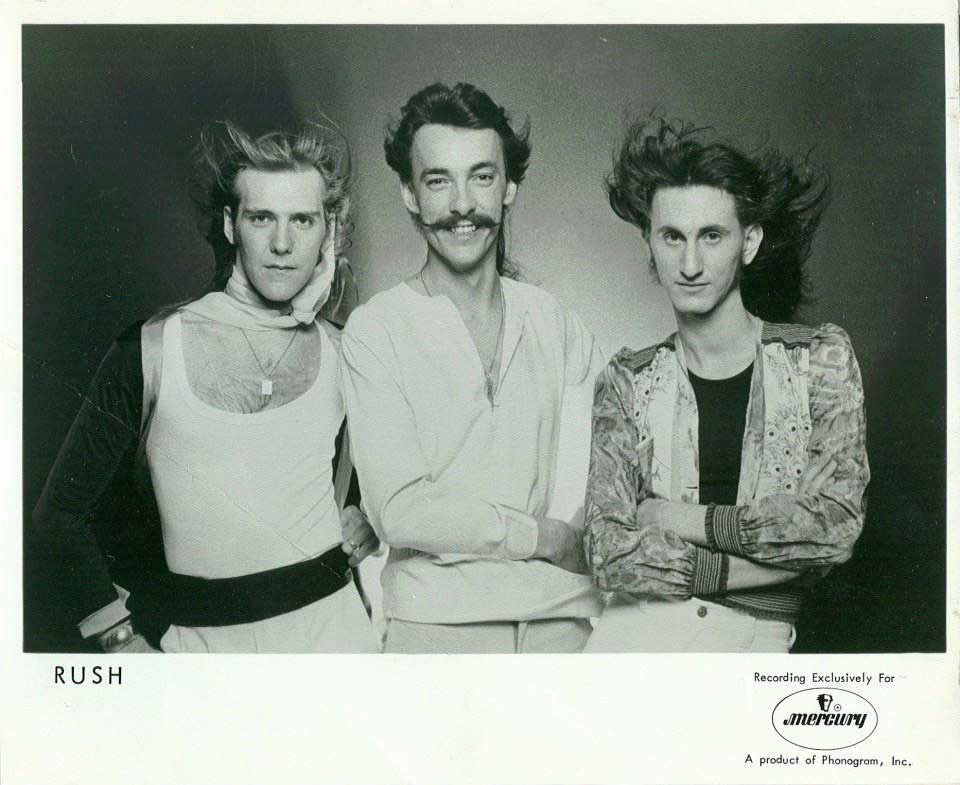All Hail The Heirs Apparent!
By Ken Waxman, Maclean's, July 1976, transcribed by pwrwindows

Rush, little-known pretenders to punk rock's raunchy throne, stormed on stage at the Summit Arena in Houston earlier this month [webmaster's note: this was likely the July 11, 1976, Sam Houston Coliseum show] - and received the kind of earsplitting roar usually reserved for such legendary hard-rock bands as Led Zeppelin and Grand Funk Railroad. "It's the energy level that really gets me off," yelped one halter-topped fan. "They're bad." In the contradictory argot of rock, bad means good. But if the fans in the Summit knew what they liked in rock, it's safe to say that few knew they were cheering a band of well-adjusted all-Canadian boys from the suburbs of Toronto.
In two years Rush has leapfrogged from bars to headline in arenas such as Detroit's 13,000-seat Cobo Hall by simply playing as often and in as many places as possible. The band's music, a blitzkrieg of stratospheric guitar licks by Alex Lifeson, 22, frenzied drumming by Neil Peart, 23, and lyrics that sound as if they're forced through 22-year-old singer Geddy Lee's clenched teeth ("Got an itchin' to rock/a hate for small talk"), send teen-age fans into paroxysms of ecstasy, and has made Rush the only Canadian group in rock's aptly named "heavy metal" pantheon. Last year the band rang up more than one million dollars in concert grosses (second only to Vancouver rockers Bachman-Turner Overdrive in Canada). The group is also successful in the recording studio. More than 250,000 copies of 2112, their fourth album, a thematic sci-fi epic, have sold in the United States and Canada in the four months since its release, and the band's first three albums (Rush, Fly By Night and Caress Of Steel) have already racked up more than four million dollars in continent-wide sales.
Offstage the three members of Rush are almost recklessly normal. High-school dropouts from comfortable suburbia, Lifeson and Lee formed the band in 1968 and plugged into the sock-hop circuit with dozens of other Rolling Stones imitators. Peart was grafted onto the band by manager Ray Danniels in 1974 and today the three are about as far from the groupie-beset, drug-hazed image of rock stars as it's possible to imagine. They phone their parents after each concert and spend their time between performances in hotel rooms working on new music. At once elementary and bombastic, their songs often sound alike, with the result that Rush seems indistinguishable from half a dozen other hard-rock groups. Thus the band's popularity can be attributed less to any striking originality than to the drive of Danniels, 24, the chunky wheeler-dealer who first became involved with Rush seven years ago. In 1974 he used the sales of the band's first album (8,000 copies) as bait to snare a contract with Mercury Records. In the next two years, the band worked 50 weeks a year, often 14 days in a row, and kept to a punishing schedule that took it touring to every American state but four.
Although a national tour is planned later this year, Canada seems almost an afterthought. No wonder, since, with the exception of Toronto, Montreal and Vancouver, Canada lacks radio outlets that play Rush's type of music.
But everything's relative. The bulging concert halls, passionate fans and Geddy Lee's Porsche are not enough. Rush wants to be the Canadian rock band in North America and to do that they have to dethrone Bachman-Turner Overdrive, a band that last year made $1.3 million in a mere 13 concerts. Neil Peart isn't worried. "BTO'S dying," he says. "Now it's time to see what we can do."